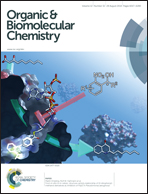A fluorescent probe for intracellular cysteine overcoming the interference by glutathione†
Abstract
Cysteine (Cys) plays important roles in many physiological processes of eukaryotic cells and its detection in cells is of fundamental significance. However, glutathione (GSH), homocysteine, N-acetyl-L-cysteine and other thiols greatly hamper the detection of Cys. In particular, GSH strongly interferes with the detection of cellular Cys (30–200 μM) due to its high intracellular concentration (1–10 mM). In this work, an off–on fluorescent probe (HOTA) for the detection of Cys is presented. This probe possesses both excellent sensitivity and satisfactory selectivity for cellular Cys detection: with the addition of 200 μM Cys, the fluorescence intensity of the probe (10 μM) enhanced 117-fold and the detection limit was calculated to be 13.47 μM, which is lower than the cellular Cys concentration; the probe also selectively detected 30–200 μM cysteine over 1–10 mM glutathione. Consequently, cell imaging experiments were performed with probe HOTA. Furthermore, the results of the thiol-blocking and GSH synthesis inhibiting experiments confirmed that the intracellular emission mainly originates from the interaction between Cys and HOTA.


 Please wait while we load your content...
Please wait while we load your content...